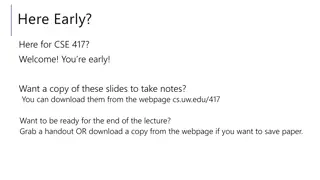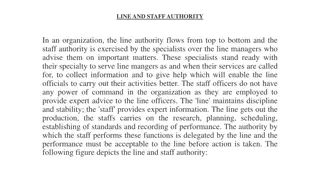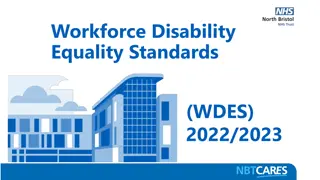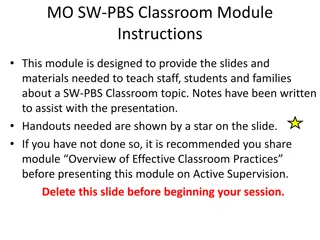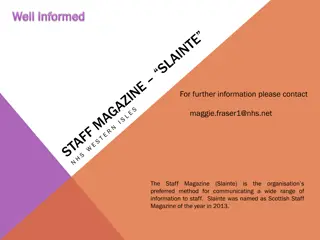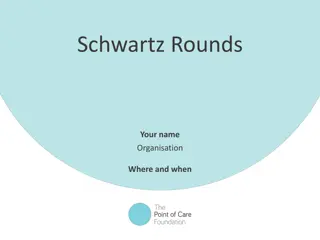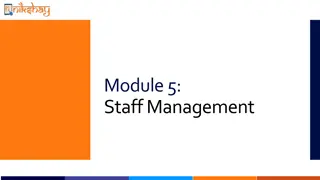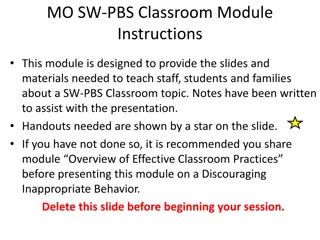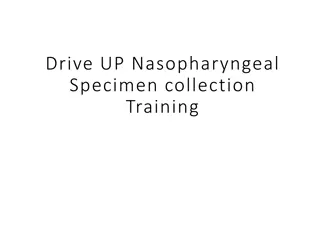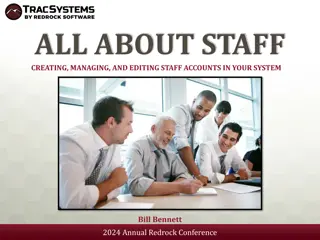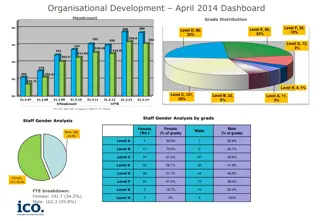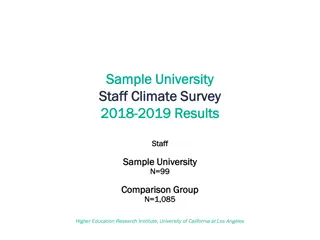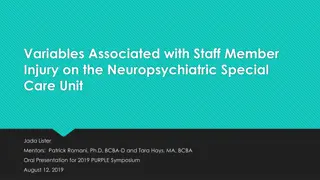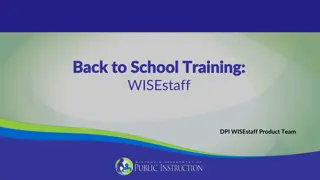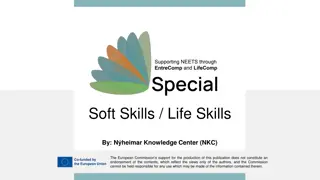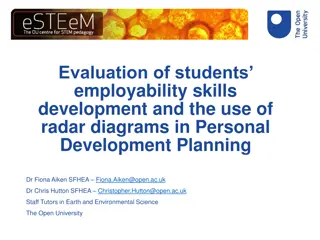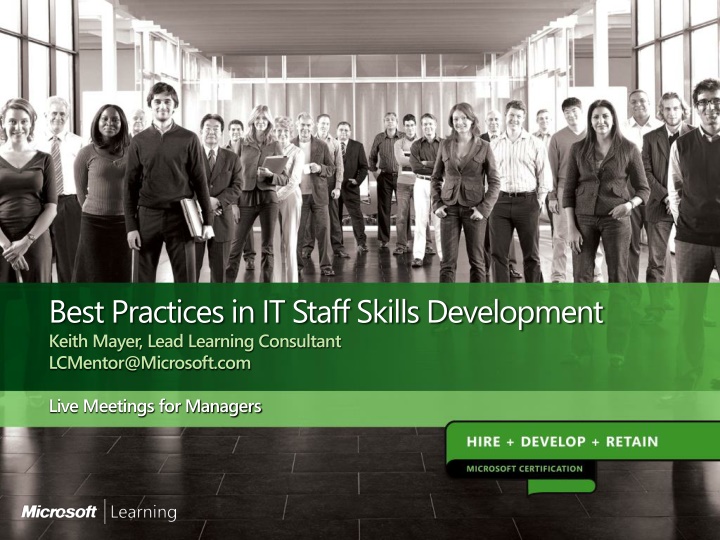
IT Staff Skills Development Best Practices
Explore best practices in IT staff skills development led by Microsoft experts, focusing on reducing training costs, aligning with business goals, utilizing Microsoft Learning resources, and overcoming common challenges. Enhance your team's expertise, efficiency, and project deployment with Microsoft certifications and certified learning consultants.
Download Presentation

Please find below an Image/Link to download the presentation.
The content on the website is provided AS IS for your information and personal use only. It may not be sold, licensed, or shared on other websites without obtaining consent from the author. If you encounter any issues during the download, it is possible that the publisher has removed the file from their server.
You are allowed to download the files provided on this website for personal or commercial use, subject to the condition that they are used lawfully. All files are the property of their respective owners.
The content on the website is provided AS IS for your information and personal use only. It may not be sold, licensed, or shared on other websites without obtaining consent from the author.
E N D
Presentation Transcript
Best Practices in IT Staff Skills Development Keith Mayer, Lead Learning Consultant LCMentor@Microsoft.com Live Meetings for Managers
Best Practices in IT Staff Skills Development Session Objective Discover how enterprise IT managers are driving down training costs and controlling TCO with prescriptive readiness plans that align with their specific business goals leveraging Microsoft Learning resources. Agenda Common challenges in IT skills development Introduction to Microsoft Learning resources Building effective IT skills development plans Q&A
Common Challenges in IT Skills Development Training Cost Hard Costs Travel Expenses Timing Tracking Progress Measuring ROI Employee Retention Relevant Content Motivating Learners
Microsoft Learning Resources Learn Study Validate Enabled Microsoft Instructor-Led and E-Learning Courses Learn the skills necessary to successfully implement new technology solutions Microsoft E-Reference Reinforce learning experience and gain additional background knowledge Microsoft Certifications Validate mastery of newly acquired technology skills. Proven Skills Successfully implement and support new technology solutions. http://www.microsoft.com/learning
Microsoft Certifications Learn Study Validate Enabled Increased Employee Expertise and Retention 75% of hiring managers believe that certifications are important to team performance, and 45% of employees strongly agree that when employers pay for exams it provides a strong incentive to stay in their jobs. Enhanced Efficiency On average, 40%-55% of top-performing IT teams are comprised of MCPs. Improved Project Deployment The skill level of a team is directly responsible for how an organization performs in key IT areas. Increased Team Performance 63% of hiring managers believe that certified individuals are more productive Increased Team Performance 66% of hiring managers believe that certifications improve the levels of service and support http://www.microsoft.com/learning/en/us/certification/cert-benefits-emp.aspx
Microsoft Certified Learning Consultants Microsoft Certified Learning Consultants (MCLCs) are learning solution experts in business technology training and certification programs. MCLCs understand the complex landscape of Microsoft training resources available to enterprise organizations and how to package them into an overall skills development plan that maximizes relevancy and return on investment. Microsoft Certified Learning Consultant MCT certification requirements MCT certification requirements MCLC credential Customized, Prescriptive Learning Solutions Technology Specialist IT Professional Developer Business & performance consulting for enterprise organizations Years of experience delivering IT training curriculum Premier Microsoft certifications with deep technology consulting and field experience http://www.microsoft.com/learning/en/us/certification/mct.aspx
Microsoft Infrastructure Optimization (IO) Business Productivity 693 E-Learning Collections | 2,983 Hours of E-Learning | 122 E-Reference Books | 28 Certification Exams Workflow Transactions Search Voice Reporting and Analysis Application Server Enterprise Content Management Conferencing LOB Platform Instant Messaging / Presence Collaboration Improve Business Value and Agility Messaging Enterprise Application Integration Unified Application Platform Communications 183 E-Learning Collections | 1,502 Hours of E-Learning 129 E-Reference Books | 63 Certification Exams Custom Development and Web Data Management Data Content Creation Warehousing LOB Platform Core Infrastructure 182 E-Learning Collections | 1,805 Hours of E-Learning | 114 E-Reference Books | 84 Certification Exams Identity and Security Services IT Process and Compliance Client Services Datacenter Services
Designing an Effective IT Skills Development Program Discovery Validation Analysis Delivery Design
IT Skills Development: Discovery Phase Assess staff capacity to establish an accurate skill inventory aligned by your organization s business goals and IT initiatives. Step 1: Discovery Identify organizational and project objectives. Leverage employee s Microsoft certifications as one benchmark for measuring depth of expertise and capacity to deliver. Determine existing employee skill levels across relevant technology areas. Identify Software Assurance and Volume Licensing benefits to understand what training resources you may already have available Discovery Validation Analysis Delivery Design
IT Skills Development: Analysis Phase Identify strategic strengths of the team to maximize training investment and focus efforts where gaps exist. Step 2: Analysis Align organizational initiatives to technologies to establish capability areas. Cross reference those capability areas against existing employee skills to understand where knowledge gaps exist. Engage solution architects to consult on integrating the right level of training for each capability area into the overall methodology for the technology. Leverage Microsoft Operations Framework (MOF) to determine at which point in the project lifecycle each employee should skill up Discovery Validation Analysis Delivery Design
Aligning Skills Development to Microsoft Operations Framework Delivery Readiness http://technet.microsoft.com/en-us/library/ee923730.aspx
IT Skills Development: Design Phase Design learning solutions that map to success of the IT initiatives at hand, using the best modalities for the situation. Step 3: Design Leverage existing Microsoft Learning resources that map to required job skills Create and/or customize content and curriculum to address unique learning needs of organizational and project initiatives. Create blended learning solution that integrates learning modalities to optimize learner experience and reduces overall training costs, travel, and time out-of- office E-Learning foundational learning and concepts Instructor-Led Training Workshops learn by interactive participation E-Reference study and practice materials Customized Content for relevance to unique learning needs Mentor guided through overall curriculum by experienced coach Discovery Validation Analysis Delivery Design
IT Skills Development: Delivery Phase Provide staff with prescriptive learning roadmaps that leverage best-in-class Microsoft resources. Step 4: Delivery Build and mentor community of learners through structured delivery framework Integrate with existing learning management systems Provide mentorship, assessment and accountability to ensure training consumption Integrate training options in alignment with project plans, current workloads and responsibilities to drive knowledge relevance and retention Discovery Validation Analysis Delivery Design
IT Skills Development: Validation Phase Validate that staff has successfully completed learning objectives necessary to master new job skills. Step 5: Validation Ensure readiness goals are measurable and tied to overall business goals Produce results that map to certification metrics wherever possible Provide ongoing success reporting for all program participants Leverage program feedback as input into Discovery phase to identify new skill areas that may require additional learning curriculum Discovery Validation Analysis Delivery Design
Benefits & Results Business Benefits Accelerate ROI for new technology initiatives Drive, Track and Measure Progress Skills Development Goals linked to Business ROI Cost & Time Benefits Reduce Out-of-Pocket Training and Travel Costs Save on Billable Production Time Optimize Training Time Spent Individual Benefits Identify Relevant Training Resources Promote Learning Retention Motivate Learners
Notable Quotes Working with a Learning Consultant definitely drives value for any organization interested in strengthening their Microsoft capabilities. It s helped us focus our strategic direction, and outlined a clear, efficient and demonstrable path to get where we want to go. We believe that achieving industry-recognized certification goes a long way in encouraging associates to pursue new skills and build a career in Microsoft technologies. In the long run, we anticipate greater employee retention. Sanjeev Agarwal, Group Senior Vice President Global Microsoft Solutions Practice, Sogeti Girish Phadke Technology Excellence Group Leader, TCS
Calls to Action Leverage Microsoft Learning Resources Microsoft Learning IT Manager Portal http://www.microsoft.com/learning/itmanager Microsoft Learning Training Catalog http://learning.microsoft.com/Manager/Catalog.aspx Microsoft Certifications http://www.microsoft.com/learning/en/us/certification/cert-default.aspx Software Assurance Training Catalog http://www.microsoft.com/learning/sa-vl-catalog/savldefault.aspx Locate a Microsoft Learning Consultant or Certified Partner for Learning Solutions near you LCMentor@Microsoft.com http://www.microsoft.com/learning/en/us/classlocator.aspx Start with the Microsoft Infrastructure Optimization Model to align your skills development strategy to business goals. http://www.microsoft.com/io



